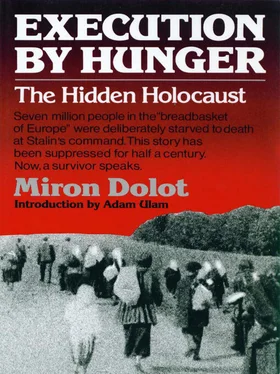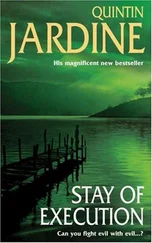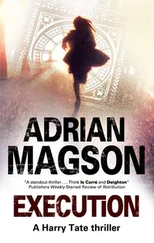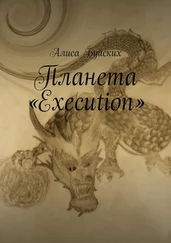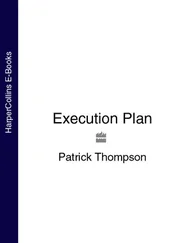“If you do not join the collective farm immediately,” he shouted like a madman, “I will kill you with my own gun!”
“With who else’s?” Mother retorted calmly.
This remark enraged him. Keeping his gun in a firing position, he ran out from behind the table and, breathing heavily, stopped in front of us.
“I’ll kill you,” he raved. As if to prove that he meant what he said, he started shooting into the ceiling.
This was quite a show. But somehow we were not afraid. Mother, composed as ever, stood quietly. Comrade Khizhniak was apparently surprised by her calmness and self-control. After firing at the ceiling, he seemed not to know what to do next. At first, he started to pack his gun with new bullets, then he put the gun into the holster. Then he took it out again and laid it on the table. Afterwards he took it off the table, spun the drum, and then counted the bullets. Finally, he put the gun into his holster, and ran out of the room.
We continued standing for a while. Mother finally yielded to my persistent requests to sit down and took a place on the bench. However, as soon as she did so, a stranger entered the room as if he had been waiting for that moment.
No doubt he was a city dweller, and he definitely was not a Ukrainian for he could hardly speak a word of Ukrainian. We did not need to be told that he was a new propagandist. He was tall and well fed, with a pale face.
“Are you comfortable?” he asked my mother almost politely. I started to think that we finally had met a pleasant official.
“You seem to enjoy sitting there…” he said, looking down at Mother, who remained seated. Then, without waiting for Mother’s reply, he suddenly shouted:
“Get up, you dirty muzhichka! [15] Muzhichka is a derogatory Russian word meaning a poor, ignorant peasant woman.
I’ll teach you how to meet a representative of the Communist Party and government!”
Mother might have been expecting the outburst, because I saw no traces of surprise on her face. Slowly she got up. But in the corners of her eyes, I noticed tears. She had been insulted.
The propagandist sat down at Comrade Khizhniak’s place and crossed his legs. He let us stand. Slowly and deliberately, he lit an expensive cigarette which he took out of his case and stared at us coldly. Then he pulled his revolver out of his holster and put it on the table.
“All right,” he said, looking at us contemptuously. “What do you want?”
This was an unexpected question. We certainly didn’t want anything from him.
“This is what I want to ask you,” Mother said. “You called me here, and I suppose you will tell me what you want from me.”
He jumped to his feet.
“Don’t you know why you were called here?” he shouted.
“How should I know?” was Mother’s answer.
His anger grew into rage. With all his might, he struck the table with his fists. His gun flew into the air from the impact and landed on the floor. He quickly grabbed it, checked it for damage, and then pointed it at Mother.
“I’ll kill you!” he raved like a lunatic.
But we were somehow neither impressed nor scared, probably because in the last few months we had endured so many terrifying experiences that we had grown indifferent to new threats.
For a moment, the propagandist seemed not to know what to do with the gun aimed at Mother. Then he lowered it and fired into the floor. This seemed to calm him down. Without saying a word, he went behind the table and took his previous place. For a moment he was silent. Then he lit another cigarette, and started again the same kind of interrogation as before.
Suddenly the door flew open and my younger brother burst in. He breathlessly told us that the Bread Procurement Commission had entered our house by force and had taken away whatever solid food they could find. Ignoring the propagandist who, of course, tried to stop us, we ran home as fast as we could, but it was too late. When we arrived, the members of the commission were loading the cart with the grain and other food we had had in reserve. It was not much, but it would have been enough for the three of us to survive on until the new harvest. Comrade Khizhniak stood near the door, playing with his gun and smiling. His smile told us that he had outwitted us.
So we were left without food, except for some potatoes and beets buried in the ground, and we would have to wait three more months for the new crop. There was no other source from which we could obtain the necessary food.
A few hours after the commission left us, following the cart containing our grain and other food, the Ten’s official visited us. He said that if we had joined the collective farm earlier, this would never have happened to us. After all, we were not kurkuls. We still would have had our bread.
“Oh, that reminds me,” he said casually, on leaving our house. “The members of the collective farm receive payment for their labor in food.” Saying this, he looked down at his feet, as if he were ashamed of what he was saying. “Therefore, you still have a chance to survive if you join the collective farm.” He was right; there was no other alternative for us.
We did not talk much that evening. As if knowing our decision, the commission woke us up in the middle of the night. The propagandist who had interrogated us the day before was in charge. Without any formalities, he asked Mother whether she wanted to join the collective farm. She said: “Yes.” He then sat down at the table under our icons and wrote the petition for her. As I recall, it said:
Whereas the collective farm has advantages over individual farming; and whereas it is the only way to secure a prosperous and happy life, I voluntarily request the collective farm’s management to accept me as a member of your collective farm.
Signature.
That was all. Mother silently signed it. The propagandist was all smiles while the members of the commission stood huddled in the corner as if they were at a funeral.
The next day, some people arrived in our backyard. Without any explanation, they entered the stable and barn and took away our horse, cow, wagon, plough, and other agricultural implements. Only after the loaded wagon departed, drawn by our own horse and followed by our cow, did a man enter our house. He informed us that we were now registered under the number 168, and that in the future, we should identify ourselves by this number.
Thus we became a mere number—number 168.
AVILLAGE messenger, walking from house to house, informed us that we had to attend the village general meeting on the following Sunday afternoon. Another messenger summoned us to the Hundred meeting which was to take place on the same Sunday evening.
Two meetings in one day could only mean that something extraordinary was in the offing. We had no idea what it could be, but at this point we could anticipate nothing but arrests, banishments, and even executions. When that Sunday came and the two meetings were over, our worst fears had become a reality for many. The victims, however, were not the ordinary villagers, but the village officials.
The general meeting took place in the village theater, formerly our church. Most of the officials on the stage were people we had never seen before. All of them were solemn, even grim. Comrade Zeitlin opened the meeting and introduced the strangers to us. The regional Party representative was first. The rest of them were the highest Party and government county functionaries: the Party county commissar, the commissar of the MTS, the commissar of GPU, and the chairman of the county Soviet executive committee. We had already heard about this quintet, for rumors had spread among the villagers that these men traveled throughout the county arresting people for no apparent reason.
Читать дальше
